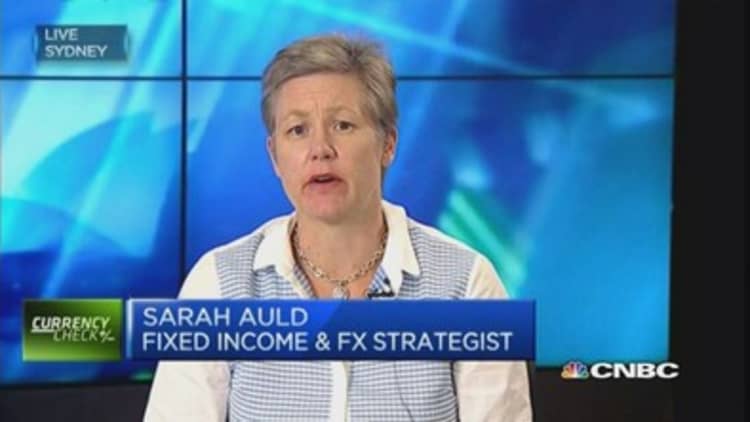With the European Central Bank about to launch its 1 trillion euro ($1.1 trillion) bond-buying program on Monday, foreign exchange experts are already preparing to readjust their forecasts for the single currency.
After the ECB announced its massive quantitative easing (QE) campaign would start Monday, the euro fell below $1.1000 for the first time since September 2003. On Friday, the currency was hovering around 1.1012. Against sterling, the euro had also fallen to near seven-year lows of 72.29 pence.
Read MoreECB ups growth forecasts; will start QE on March 9
Whether the euro could recover after the ECB announced that it was to begin purchasing 60 billion euros worth of assets a month has prompted analysts to question their forecasts for the currency.
One market analyst said the euro was being "brutally punished" by traders. "Volatility is the name of the game for today," Naeem Aslam, Chief Market Analyst at Ava Trade said in a note Friday.
"Short the euro and buy the dollar is probably the most crowded trade for the last year, and yet till this day, investors are not afraid to put more chips on the table. This is causing a tremendous amount of pressure for the euro zone currency."
Derek Halpenny, European head of global markets research at Bank of Tokyo-Mitsubishi, said in a note Thursday that his year-end forecasts for euro/dollar "might quickly look too conservative."
"(The) ECB press conference certainly highlighted the determination of the ECB to implement the QE program but the forecasts suggest the markets should not expect more," Halpenny said in a note Thursday.
Currencies tend to weaken during QE as there is more money in circulation and lower interest rates tend to encourage consumers to spend and businesses to invest. Killing three birds with one stone, a cheaper euro is expected to help combat deflation and stimulate both the region's economy and exports, which become more attractive with a cheaper currency.
"With the euro weakness which has been a bonus for a few months now this is only going to help exporters," Antonin Jullier, global head of Equity Trading Strategy at Citi, told CNBC Europe's "Squawk Box" Friday.
Speaking to the press after the ECB's regular policy meeting, President Mario Draghi's press conference said the 1 trillion euro ($1.1 trillion) bond-buying program would start on March 9. He also upgraded the ECB's economic growth forecasts for 2015 and 2016 to 1.5 percent and 1.9 percent respectively and revised its inflation forecasts.
FX analysts at Credit Suisse wrote that the ECB's press conference gave them "little reason to deviate from our bearish EUR view."
"While we have been structural EURUSD bears for some months, our most recent short trade from 22 January was to buy a 21 April expiry 1.1300 EUR put/USD call, initially as part of a put spread but which eventually transformed into an outright position. We are content to run with this position for the time being," Shahab Jalinoos, Alvise Marino and Matthew Derr, said in the Credit Suisse note.

Not everyone was so downbeat on the euro.
Sally Auld, fixed income and FX strategist at JPMorgan, told CNBC Friday that the ECB's announcement on Thursday wasn't "euro-bearish" and expected the common currency to strengthen over the coming months.
"We were a little bit surprised to see the price action overnight and we think over the next couple of months and that actually the risks are tilted more towards euro strength rather than ongoing euro weakness," Auld said, speaking to CNBC from Sydney.
"If we use things such as the size of the ECB's balance sheet and rate differentials between Europe and the U.S….our sense is that the euro will struggle to make further losses (from 1.10) against the dollar.
- By CNBC's Holly Ellyatt, follow her on Twitter @HollyEllyatt. Follow us on Twitter: @CNBCWorld


